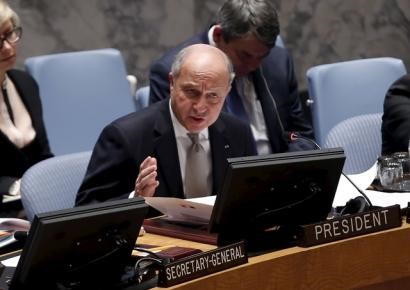By Michelle Nichols
UNITED NATIONS (Reuters) - France plans to start discussions with partners in the "coming weeks" on a United Nations Security Council resolution to lay out parameters for ending the Middle East conflict, French Foreign Minister Laurent Fabius said on Friday.
"I hope that the partners who were reluctant will not be reluctant anymore," said Fabius, referring to the United States, which has traditionally shielded its ally Israel from any action at the U.N.
The United States has said it would "reassess" its options on U.S.-Israel relations and Middle East diplomacy after Israeli Prime Minister Benjamin Netanyahu took a stand last week against Palestinian statehood during his election campaign.
In December, the United States voted against a Palestinian drafted resolution calling for an Israeli withdrawal from the occupied West Bank and East Jerusalem and the establishment of a Palestinian state by late 2017.
In response to Fabius' comments, a U.S. official, speaking on condition of anonymity, said: "We're not going to get ahead of any decisions about what the United States would do with regard to potential action at the U.N. Security Council."
He said Washington continues to engage with key stakeholders, including France, "to find a way forward that advances the interest we and others share in a two state solution."
France, along with Britain and Germany, had also drafted a Security Council resolution late last year to set parameters for ending the conflict, but the text was put on the back burner until after the Israeli elections, which took place last week.
"We have said that these parameters have to be defined and recognised by the Security Council and that obviously the two parties have to discuss, but the discussion will be accompanied by an international effort," Fabius told reporters at the United Nations in New York.
Palestinians seek a state in Gaza, the West Bank and East Jerusalem, lands Israel captured in 1967.
Ahead of his re-election, Netanyahu said he would not permit a Palestinian state to be created under his watch and promised to go on building settlements on occupied lands.
Most countries view Israel's settlement building on occupied land as illegal. U.N. Middle East envoy Robert Serry told the Security Council on Thursday that continued settlement building may have already killed a possible two-state solution.

"Today nothing has moved forward, still development of settlements, the Palestinians are in a more and more difficult situation and we cannot stay like that," Fabius said.